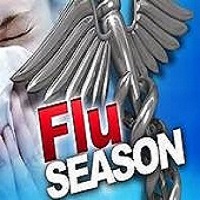FRANKFORT, Ky. (Nov. 13, 2019) - The Department for Public Health (DPH), within the Cabinet for Health and Family Services (CHFS), is encouraging Kentuckians to get vaccinated against the flu, as the holiday season is approaching.
“As the holidays approach, people will be traveling and families will gather together, increasing the potential for exposure to the flu,” said Dr. Angela Dearinger, Commissioner of DPH. “We are strongly urging anyone who hasn’t received a flu vaccine, particularly those at high risk for complications related to the flu, to check with local health departments or other providers.”
DPH officials are reporting 384 laboratory-confirmed flu cases in regions across the state since Aug. 4.
Infection with the flu virus can cause fever, headache, cough, sore throat, runny nose, sneezing and body aches. Flu can be very contagious. It takes about two weeks for the vaccine to become fully effective, so it is very important to get the flu shot as soon as possible.
The Centers for Disease Control and Prevention (CDC) Advisory Committee on Immunization Practices (ACIP) recommends flu vaccine for all individuals six months of age and older. People who are strongly encouraged to receive the flu vaccine because they may be at higher risk for complications or negative consequences include:
- Children age 6 months through 59 months (less than 5 years); • Women who are or will be pregnant during the influenza season; • Persons 50 years of age or older
- Persons with extreme obesity (Body Mass Index of 40 or greater); • Persons aged 6 months and older with chronic health problems; • Residents of nursing homes and other long-term care facilities; • Household contacts (including children) and caregivers of children aged ≤59 months (i.e., aged <5 years, particularly contacts of children aged <6 months) and adults aged ≥50 years
- Household contacts and caregivers or people who live with a person at high-risk for complications from the flu; and
- Health care workers, including physicians, nurses, and other workers in inpatient and outpatient-care settings, medical emergency-response workers (e.g., paramedics and emergency medical technicians), employees of nursing home and long-term care facilities who have contact with patients or residents, and students in these professions who will have contact with patients
The flu vaccine has been changed to better protect against the types of flu that were seen last season. Both the CDC and manufacturers of the flu vaccine report that there are no shortages of vaccine. Vaccination can be given any time during the flu season, but providers are encouraged to administer the vaccine as soon as possible. Medicaid, Medicare and most private health insurance providers cover flu vaccination as a preventive service.
The flu vaccine is especially important in light of the longest flu season the nation experienced last year. The CDC reports that more than 647,000 flu-related hospitalizations occurred and more than 61,000 people died as a result of the flu. In Kentucky, there were 194 flu-related deaths, two of which were children.
It is especially important for pregnant women to be vaccinated before or during pregnancy. Antibodies cross the placenta and provide immunity to infants up to 6 months of age, when the infant is eligible to receive their dose of flu vaccine. Last season in Kentucky, there were infants less than one month old that had the flu.
"Getting the flu can be debilitating and sometimes life-threatening," added Dearinger. “Vaccination is the best tool we have to prevent the flu. It is also extremely important to take simple preventive steps to avoid the flu and other illnesses that tend to circulate at this time of year – wash your hands frequently, cover your mouth when you cough or sneeze and stay home when you are sick.”
DPH relies on sites such as doctors’ offices, hospitals and health departments to help track the level of influenza activity in the state and to identify which strains of the flu are circulating in Kentucky. These voluntary sites collect data and report influenza-like illness (ILI) cases according to age groups each week. This sampling represents only a small percentage of influenza cases for the state, but contributes to the ongoing assessment of flu activity in the commonwealth and helps determine the weekly level of flu activity.








